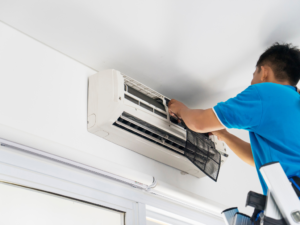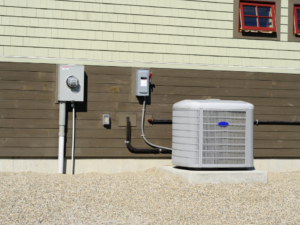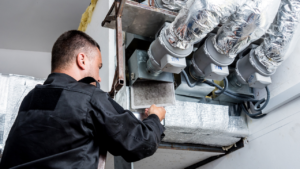Are you looking for a way to keep your home clean, healthy, and efficient? AC replacement may be the answer. AC systems are responsible for cooling our homes during hot summer days, as well as filtering out pollutants like pollen, dust mites, and other allergens. If your AC system is not working properly or has become outdated, it can lead to air quality issues in your home that can affect your health and comfort. Replacing an old AC system with a new one will improve the air quality of your home while also providing energy savings year-round. In this blog post, we’ll look at why AC replacement is necessary for clean, healthy, and efficient air in your home.
#1 Benefits of AC Replacement for Home Air Quality
The benefits of AC replacement for home air quality are numerous. One of the most important benefits is improved air quality. AC systems act as a filter, trapping pollutants like pollen, dust mites, pet dander, and other allergens before they enter your home. An old AC system can become clogged with dirt and dust, leading to poor air quality that can aggravate allergies or asthma. Replacing an AC system with a newer model will ensure that it functions properly and filters out pollutants more efficiently than an older model. This can help improve the health of those living in the home, especially those who have allergies or respiratory conditions.
Another benefit of AC replacement for home air quality is increased energy efficiency. AC systems have become increasingly efficient over time due to improvements in technology and design. Older AC systems use more energy than their modern counterparts, resulting in higher electricity bills and wasted energy resources. Replacing an AC system with a new one can result in significant savings on utility bills while also reducing your carbon footprint.
Finally, AC replacement can provide added comfort throughout the year by evenly distributing cool or warm air throughout the house depending on climate and seasonality. When an AC system wears out or becomes outdated, it may not be able to keep up with demand during peak times of use such as summer months when temperatures are high; this can lead to uneven cooling or heating within your home. A new AC system will be able to cope with higher demand while maintaining comfortable temperatures throughout the house all year round.
#2 The Cost of AC Replacement and How to Save Money
The cost of AC replacement can seem daunting, but there are several ways to save money on the project. AC systems typically last anywhere from 10 to 15 years depending on their usage and maintenance. Older AC units tend to be less efficient than newer models and will require more energy to operate, leading to higher electricity bills. Replacing an AC system with a new model can result in significant savings over time thanks to its greater efficiency. Additionally, AC replacement can qualify for certain tax credits due to its energy efficiency; these credits could help offset some of the costs associated with AC replacement.
Another way to save money on AC replacement is by taking advantage of rebates or discounts offered by local retailers or utility companies. Many utility companies offer discounts for customers who upgrade their AC systems, which can make it significantly cheaper than buying a new one outright. Additionally, retail stores often have sales during certain times of the year that can provide further savings; you may be able to purchase an AC system at a discounted price during this time.
The most important factor in saving money when replacing your AC system is engaging the services of a qualified professional HVAC technician who has experience installing AC systems. If you attempt to install the AC system yourself without proper knowledge or experience, you risk damaging it and having to spend more money repairing it than if you had hired a professional in the first place. Furthermore, unless the installation is done properly and according to standards set by your local building codes, insurance companies may not cover any issues related to improper installation down the road. A qualified HVAC technician will also be able to advise you on choosing an AC unit that best fits your needs based on size, efficiency ratings, and other factors—all in line with applicable building codes—which will ensure that your home gets maximum cooling benefits from your new AC system for years ahead.
In conclusion, replacing an old AC system with a newer model is essential for keeping your home clean, healthy, and efficient; however, the cost of AC replacement can be high if not done properly. Fortunately, there are several ways you can save money when upgrading your AC system such as taking advantage of rebates or discounts offered by local retailers or utility companies and hiring a qualified HVAC technician who has experience installing AC systems according to applicable building codes; doing so will ensure optimal performance from your new unit while also providing peace-of-mind that any issues down the road will be covered by insurance policies should they arise due to improper installation procedures.
#3 AC Replacement Maintenance Tips to Prolong the Lifespan of Your AC System
Once an AC system has been replaced, it’s important to ensure that it is properly maintained in order to prolong its lifespan and keep it running efficiently. Regular AC maintenance is essential as even the most expensive AC systems can be damaged by dirt and dust; these particles can affect AC performance and cause problems with airflow, resulting in higher electricity bills. Additionally, AC systems need to be inspected regularly for any signs of damage or wear; if not addressed promptly they may lead to further deterioration and costly repairs.
#4 Reasons Why AC Replacement is Essential for Energy Efficiency
AC replacement is an essential step in achieving energy efficiency in the home. Old AC systems are often less efficient than newer mod AC systems operate by transferring heat from inside a building or home to the outside environment, meaning that they can be used to regulate the temperature within a space while also reducing energy consumption. This is due to AC units having higher SEER (Seasonal Energy Efficiency Ratio) ratings which indicate how much cooling power they produce when compared to their energy consumption. A higher SEER rating means that an AC system can cool a given area more efficiently and use less energy in the process.
In addition, modern AC systems offer various features that make them more energy efficient than their older counterparts. For example, most new AC units come with motion sensors that automatically turn off the system if no one is present in the room for a certain amount of time, thus reducing energy wastage when nobody is using it. They may also feature variable speed compressors and fan motors which adjust their power output according to outdoor temperatures, enabling them to run at optimal efficiency levels regardless of weather conditions. Furthermore, some AC systems incorporate smart technology allowing users to control settings remotely using their smartphones or other connected devices, allowing them to fine-tune AC performance based on preferences such as desired comfort level and air quality—all while still cutting down on energy usage.
By replacing your old AC system with a newer model you can enjoy greater comfort indoors while reducing your electricity bills and contributing towards overall reduced emissions caused by inefficient ACs running inefficiently. AC replacement is especially beneficial for those living in warm climates where temperatures can soar throughout summer; whereas old ACs would struggle to keep up with these extreme temperatures, newer models boasting higher SEER ratings should have no problem keeping indoor air at comfortable levels all year round—and doing so with far lower energy consumption than before!
Conclusion
AC replacement is an essential step to improving energy efficiency in the home. New AC systems have higher SEER ratings and offer features such as motion sensors, variable speed compressors, fan motors, and smart technology that can help reduce electricity bills while still providing users with optimal comfort indoors. With AC replacement, you can enjoy greater indoor air quality at a lower cost of operation than ever before! Whether you’re looking for improved performance or reduced emissions from your AC system, replacing it with a more modern model will give you the best results possible.




